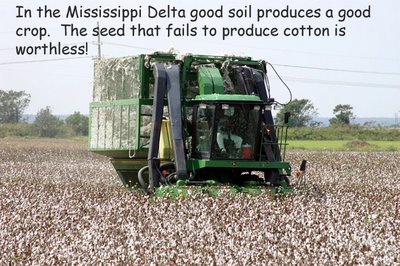The parable of the sower
 A seed is a ripened plant ovule that contains an embryo that is used to produce a new crop. When a farmer or sower scatters grain seed it is for the purpose and objective of harvesting a crop of grain, cotton or something.
A seed is a ripened plant ovule that contains an embryo that is used to produce a new crop. When a farmer or sower scatters grain seed it is for the purpose and objective of harvesting a crop of grain, cotton or something.
This parable gives three ways that the farmer's seed can fail to produce a crop. In all three ways the seed is worthless in producing a crop. The seed that the birds ate never even got off the launching pad and thus failed to produce a crop. The seeds that fell on the rocky soil sprang up quickly, but because the soil was shallow the sun scorched the plants and they withered and never lived to produce a crop. The third case of seed that failed to produce a crop was the seed that fell among thorns which choked the plants thus preventing any crop. In all three of these cases the only objective or purpose for the farmer planting the seed failed. Although two of the three soils were able to germinate and produce a plant, no more was accomplished for the farmer than the seed that were eaten by the birds. These plants were doomed from the beginning and they never had any chance to produce a crop. However, the seed that fell on good soil produced a crop of a hundred, sixty, or thirty times what was sown. This was the only soil that achieved the objective of producing a crop.
In the parable of the sower the seed represents the word of God or the gospel. The purpose of the gospel is to produce a Christian in the one who hears the word of God. The Christian that is produced will produce a crop yielding a hundred, sixty, or thirty times what was sown. The first failed attempt is when the evil one snatches the word away before any reaction from the hearer. This is like the seed on the path. The second failed attempt is the hearer that receives the word with joy, but he has no root and lasts only a short time. When trouble or persecution comes, he falls away. The third failure is the hearer that hears the word but the worries and deceitfulness of life choke it, making it unfruitful. Of these three, one never professed faith and the other two had false professions. The goal of the message is to produce Christians and just as there were three soils that produced no crop for the farmer, there were three types of hearers that did not produce a Christian. There was only one soil that produced a crop of grain and there was only one type of hearer that produced a crop. The point of the parable is to make a direct comparison of the four kinds of soils with the four kinds of hearers. No crop, no Christian in three comparisons. A crop, a Christian in one and only one comparison.


8 comments:
"The goal of the message is to produce Christians and just as there were three soils that produced no crop for the farmer, there were three types of hearers that did not produce a Christian. "
Perfect! Great analysis.
Some say that we say that God sends people to Hell for not producing fruit. Actually, they are not producing fruit because they are going to Hell. Fruit production is the result of true saving faith
Jazzycat, are you saying the crop is a christian?
IOW, fruit represent more christians?
Bluecollar,
Very well said about fruit production. This is exactly what the parable is talking about. No fruit, no Christian and no Christian, no fruit.
Jim,
Yes, the parable is comparing an agriculture principal to a spiritual principal. The purpose of scattering seed is to produce a crop (fruit) and not just a plant that lives for a little while and dies without producing fruit.
In the spiritual comparison the seed is the word or message and the crop (fruit) are Christians. A successful cotton seed will produce a plant that has cotton and many more seeds. When the Word is successful in a hearer it will produce a Christian that produces fruit.
Jazzycat
Jazzcat, can I ask a personal question?
In your life, how much fruit have you produced? IOW, how many souls have you personally led to Christ?
Jim,
Great question. I think the the fruit in this parable can be much more than just one on one evangelism. There are many ministries that can help lead people to Christ as well as prayer, financial donations, etc. The Gideon Ministry, being involved your church ministries such as VBS are a couple of examples.
In my conversion a family whose Christian light shinned very brightly was the first step in my process. I have been involved in a prison ministry and also the EE ministry, but I do not even consider, count, or deem anything I have done or do as worthy of anything. It is quite pathetic considering the gift of eternal life that comes thru Jesus Christ. As to leading someone to Christ, you know that being a believer in the reformed faith means I believe that the Holy Spirit accomplishes bringing people to faith. All human beings can do is give the external call.
Preparing a meal, assisting in disasters, cleaning rest rooms as that lady in the mine disaster did can all be fruitful in bringing people to Christ.
Jazzycat
Jazzycat, thanks for your honesty.
Surely in this parable, the problem is not with the seed but rather with the soil.
If the soil represents the heart of a person, are you saying that certain peoples hearts are better than others?
Is the seed ineffective in establishing growth? Is God's word restricted by man?
It would seem to me that the defining of fruit and its quantity are entirely subjective and therefore unworthy as a gauge of salvation.
Jim,
You asked.....
(If the soil represents the heart of a person, are you saying that certain peoples hearts are better than others?)
This parable gives the three reasons that the Word was ineffective with the three types hearers that failed to respond with true saving faith. Why they were effected this way was not dealt with in this parable.
I would refer you to John 3:3, John 6:37, John 6:44, John 6:65, Eph 2:4-5 for why three didn't respond and why one did respond.
As these verses point out it is about God's grace and the Holy Spirit regenerating and drawing their hearts and not about some hearts being better than others.
You stated........
(It would seem to me that the defining of fruit and its quantity are entirely subjective and therefore unworthy as a gauge of salvation.)
I would suggest that you take that up with Jesus in this parable because he is certainly judging people being a Christian on their response to the Word and the fruit that does or does not result. He is pointing out that some profess a false profession and then permanantly fall away.
Jazzycat
Jazzycat, One wonders that if one person comes to Christ, why not others? Are some people's hearts just more sensitve than others; are some just more spiritually wise. You and I know that the answers to these questions are found, among other places, in John 6 and chapt. 10.
Someone actually answered me by saying that "some just receive the gospel better than others". My jaw dropped. I was astounded!
Post a Comment